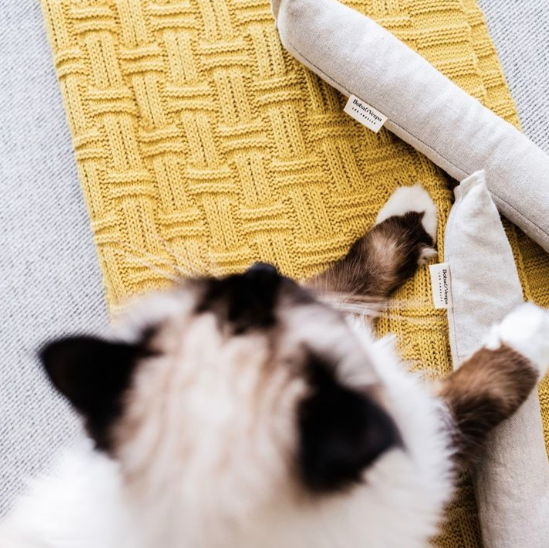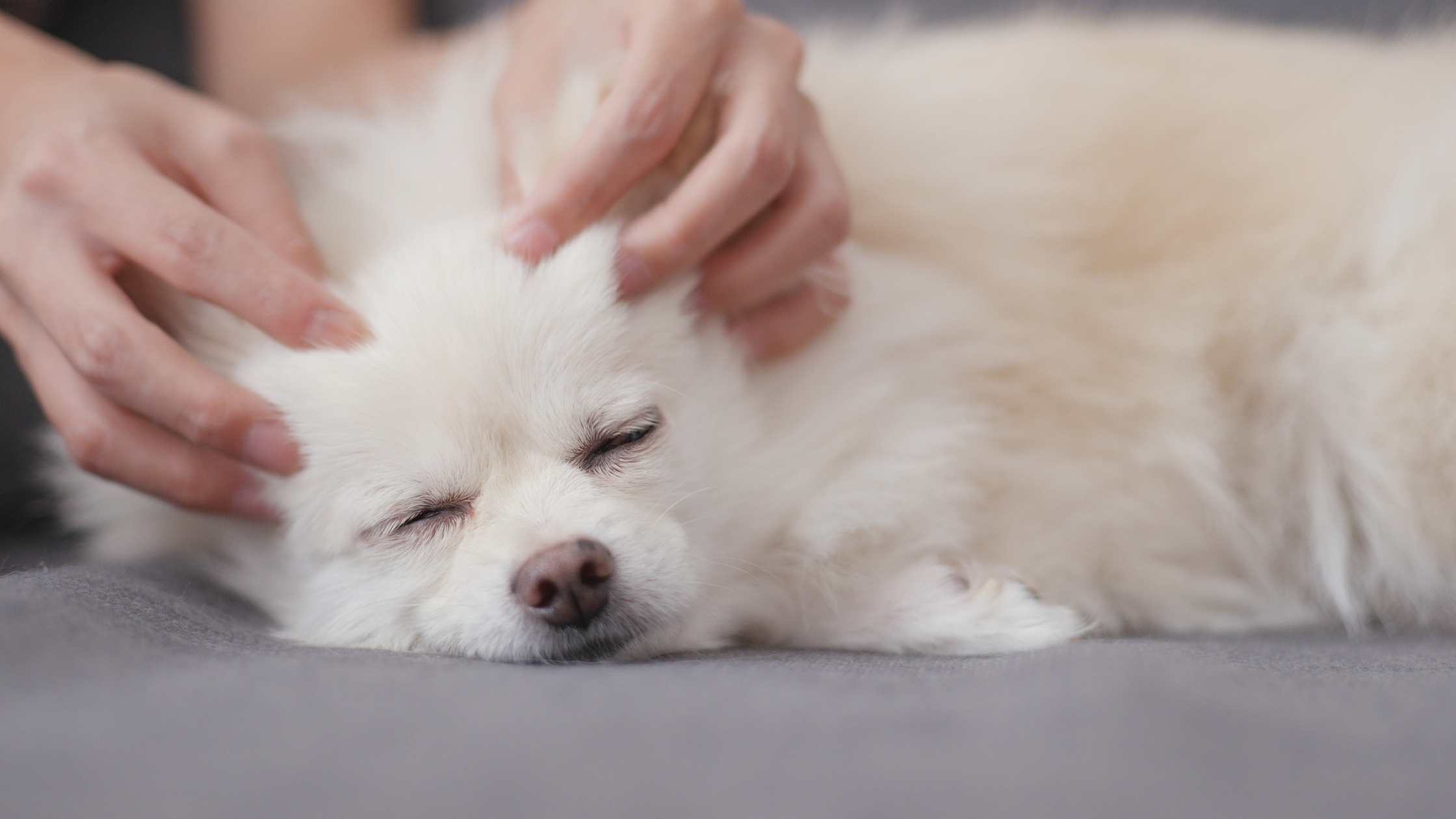It's early morning, and you're making coffee when you notice a faint smell near the water heater. You turn the corner and freeze: your cat is peeing outside the litter box again. The floor is damp, the air is sharp with the scent of cat urine, and you're left wondering what went wrong. Despite cleaning the box, buying a new litter, and maybe even trying a covered litter box, your feline friend keeps choosing the wrong spot.
If this sounds familiar, you're not alone. Inappropriate urination is one of the most common behavior problems reported by cat owners. Whether your cat suddenly starts peeing outside the litter box or has been doing it for a while, it can be frustrating, confusing, and distressing for both of you.
In this blog, we're going to cover everything you need to know about why your cat pees outside the litter box, including:
-
Understanding the reasons behind inappropriate urination
-
Fixing litter box problems
-
How to restore good habits
Read on to understand your cat's behavior, make sense of litter box issues, and bring peace (and cleanliness) back to your home.
Understanding Why Your Cat Pees Outside the Litter Box
When a cat pees outside the litter box, it's rarely out of spite. Most cats are naturally clean animals who prefer to bury their waste. If your cat decides to urinate elsewhere, there's usually an underlying cause – either medical, environmental, or behavioral.
Medical Issues to Rule Out
The first step is always to schedule a physical examination with your vet. Many cats pee outside the litter box because they associate it with pain. Common medical causes include:
-
Urinary tract infection (UTI): A UTI can cause frequent, painful urination, leading cats to avoid the litter box.
-
Bladder infection or bladder stones: These conditions irritate the bladder wall, causing discomfort during urination.
-
Kidney disease: In older cats, kidney issues can increase urination frequency or make it more difficult to hold urine.
-
Diabetes and thyroid disease: Both can alter a cat's urination habits.
Male cats are especially prone to urinary blockages – a potentially life-threatening emergency. If your cat is straining to urinate or producing little to no urine, contact a veterinary medicine professional immediately.
Behavioral or Environmental Factors
If your vet rules out a medical issue, it's time to look at your cat's environment. Cats are creatures of habit, and even small changes can trigger stress. Anxious cats or those in multi-pet households often develop litter box issues when they feel threatened or uncomfortable.
Common triggers include:
-
A new cat or other pets introduced into the home.
-
Loud noises, construction, or rearranged furniture.
-
A dirty or covered litter box that traps smells.
-
Conflict between multiple cats sharing one litter tray.
Anxiety or tension in a cat's environment can easily lead to inappropriate urination, especially if the cat's usual location feels unsafe.
Fixing Litter Box Problems
Once medical causes have been ruled out, it's time to examine your cat's litter box setup. Many cats develop litter box problems simply because the box, the litter, or the location doesn't meet their needs.
Have Enough Litter Boxes
A general rule of thumb for cat owners: you should have as many litter boxes as you have cats, plus one. For example, if you have two cats, you should provide three boxes. When there's only one litter box for multiple cats, territorial behavior and stress can increase.
Most cats prefer to have options – especially if one box isn't clean enough. Ensure each litter box is easily accessible and situated in a quiet, low-traffic area that provides cats with privacy.
Litter Type Matters
Cats have strong preferences when it comes to the texture and scent of their litter. Cats prefer unscented, clumping litter with a fine texture that feels soft on their paws. Avoid heavily perfumed cat litter, as the artificial scent can overwhelm your cat's nose.
If you've recently switched to a different litter type, your cat may dislike the change. Try offering two boxes with different types of litter and see which one your cat prefers.
Covered vs. Uncovered Boxes
While covered litter boxes may look tidier, they can trap odors and humidity, and limit a cat's visibility. Many cats dislike covered boxes because they feel confined or can't see approaching pets. Try replacing covered boxes with open ones, or offer both to see which your cat chooses.
Remember, each cat is different. One cat may feel safe in a covered box, while another avoids it entirely.
Keep It Clean
Cats are meticulous creatures. Clean litter is essential to prevent avoidance. Scoop the box at least once a day and completely replace the litter every week or two. Wash the box with mild soap and hot water, avoiding strong cleaners that might repel your cat's sensitive nose.
To make cleanup more sustainable, try using these Compostable Cat Litter Bags instead of plastic ones. They're leak-proof, odor-proof, and certified compostable – perfect for collecting and disposing of used litter without contributing to the landfill's plastic waste. Simply scoop, tie, and toss them into your home compost or an industrial composting facility for an earth-friendly cleanup routine.
Understanding Cat Behavior and Preferences
Even when the litter box setup is perfect, behavioral issues or emotional stress can cause a cat to urinate outside the designated litter area.
Stress and Anxiety
Cats are sensitive to changes in their environment. New furniture, new people, or multiple pets can cause anxiety. Some cats respond by marking territory with urine. Others avoid the litter box altogether.
Anxious cats need stability and predictability. Use pheromone diffusers or calming sprays to reduce stress. If your cat peeing outside seems linked to specific events – like visitors, loud noises, or seeing other cats outside – try to minimize those triggers.
For an added layer of support, consider a Calming Supplement for Cats with Hemp Oil. Made with natural ingredients like MCT Oil, Hemp Extract, and plant-based terpenes, this gentle supplement helps reduce anxiety and promote relaxation, especially during stressful events like loud noises, travel, or household changes. It's easy to administer and won't make your cat drowsy, helping your feline friend stay calm and comfortable while regaining confidence with their litter box habits.
Territorial Marking vs. Inappropriate Elimination
It's important to distinguish between marking and inappropriate urination. Marking usually involves small amounts of urine sprayed on vertical surfaces. Inappropriate elimination often occurs when a full bladder is emptied on horizontal surfaces, such as carpets or laundry.
Male cats and cats in multi-cat homes are more likely to mark their territory, especially when other cats are nearby. Spaying or neutering reduces marking in most cats.
Cats' Preferences Evolve
Sometimes, cats refuse their litter box after a negative experience, such as a loud noise while using it or pain from a urinary tract infection. They may associate that discomfort with the box and seek new locations.
If this happens, try introducing a new litter box in a different spot. Make it appealing with more litter, easy access, and a calm environment. Use small rewards, such as treats, when your feline friend returns to using the proper box.
Helping Your Cat Relearn Good Habits
Once you've identified the cause, the goal is to encourage your cat to start using the litter box again and rebuild positive associations.
Make the Box Appealing
Keep the litter tray in your cat's usual location if possible. Cats tend to prefer familiarity and may resist drastic changes. If you must move it, do so gradually – just a few inches per day –until it reaches the desired spot.
To attract kitty back to the litter box:
-
Keep it spotless and well-lit.
-
Use familiar litter that matches your cat's taste and texture preference.
-
Avoid placing it near food, water, or loud appliances.
-
Prevent Access to Problem Area
If your cat keeps returning to the same place outside the litter, block access temporarily. Use double-sided tape or aluminum foil to make the area less appealing. Clean thoroughly with an enzyme-based cleaner to remove all traces of cat urine. Cats have a strong sense of smell, and a lingering odor can invite repeat accidents.
Reward and Reinforce
When your cat uses the litter box correctly, offer praise or a treat as a reward. Cats respond well to positive reinforcement, especially when you catch them in the act of doing the right thing. Remember to be patient as retraining takes time. Punishment or scolding will only exacerbate fear and worsen behavioral issues.
When to Call the Vet
Even after adjustments, if your cat's peeing outside continues, revisit your vet. Some medical issues, such as bladder stones, urinary tract infections, or kidney disease, can come and go. Regular veterinary medicine checkups ensure that your cat's health isn't the underlying cause.
Your vet may recommend urine tests or imaging to examine the bladder wall and rule out recurring infections. Don't assume it's "just behavioral" – medical and emotional health are often intertwined.
Preventing Future Litter Box Problems
Once your cat is back on track, prevention is all about maintaining good habits:
-
Clean regularly: Scoop daily and refresh litter often.
-
Provide options: Ensure you have enough litter boxes for all the cats in your home.
-
Monitor changes: Keep an eye on your cat's urination habits. Sudden changes can signal health issues.
-
Reduce stress: Keep your cat's environment calm and consistent.
-
Use quality litter: Stick with the type your cat prefers. Don't switch brands unnecessarily.
Finding the Way Back to the Box
By paying attention to your cat's environment, ruling out health concerns, and tailoring their litter box setup to their preferences, you can help your cat return to normal habits, keeping your home clean and odor-free.









